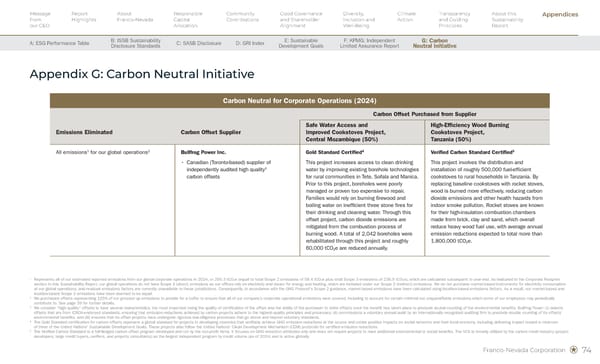Franco-Nevada Corporation 74 Appendix G: Carbon Neutral Initiative 1 Represents all of our estimated reported emissions from our global corporate operations in 2024, or 295.3 tCO2e (equal to total Scope 2 emissions of 58.4 tCO2e plus total Scope 3 emissions of 236.9 tCO2e), which are calculated subsequent to year-end. As indicated in the Corporate Footprint section in this Sustainability Report, our global operations do not have Scope 1 (direct) emissions as our offices rely on electricity and steam for energy and heating, which are included under our Scope 2 (indirect) emissions. We do not purchase market-based instruments for electricity consumption at our global operations, and residual emissions factors are currently unavailable in these jurisdictions. Consequently, in accordance with the GHG Protocol's Scope 2 guidance, market-based emissions have been calculated using location-based emissions factors. As a result, our market-based and location-based Scope 2 emissions have been deemed to be equal. 2 We purchased offsets representing 125% of our grossed up emissions to provide for a buffer to ensure that all of our company’s corporate operational emissions were covered, including to account for certain minimal but unquantifiable emissions which some of our employees may periodically contribute to. See page 39 for further details. 3 We consider "high quality" offsets to have several characteristics, the most important being the quality of certification of the offset and the ability of the purchaser to retire offsets once the benefit has taken place to preclude double-counting of the environmental benefits. Bullfrog Power: (i) selects offsets that are from ICROA-endorsed standards, ensuring that emission reductions achieved by carbon projects adhere to the highest-quality principles and processes; (ii) commissions a voluntary annual audit by an internationally recognized auditing firm to preclude double counting of its offsets’ environmental benefits; and (iii) ensures that its offset projects have undergone rigorous due-diligence processes that go above and beyond voluntary standards. 4 The Gold Standard certification for carbon offsets represent a global standard for projects in developing countries that verifiably achieve GHG emission reductions at the source and create positive impacts on social networks and their local economy, including delivering impact toward a minimum of three of the United Nations' Sustainable Development Goals. These projects also follow the United Nations’ Clean Development Mechanism (CDM) protocols for certified emission reductions. 5 The Verified Carbon Standard is a full-fledged carbon offset program developed and run by the non-profit Verra. It focuses on GHG reduction attributes only and does not require projects to have additional environmental or social benefits. The VCS is broadly utilized by the carbon credit industry (project developers, large credit buyers, verifiers, and projects consultants) as the largest independent program by credit volume (as of 2024) and is active globally. Carbon Neutral for Corporate Operations (2024) Carbon Offset Purchased from Supplier Emissions Eliminated Carbon Offset Supplier Safe Water Access and Improved Cookstoves Project, Central Mozambique (50%) High-Efficiency Wood Burning Cookstoves Project, Tanzania (50%) All emissions1 for our global operations2 Bullfrog Power Inc. • Canadian (Toronto-based) supplier of independently audited high quality3 carbon offsets Gold Standard Certified4 This project increases access to clean drinking water by improving existing borehole technologies for rural communities in Tete, Sofala and Manica. Prior to this project, boreholes were poorly managed or proven too expensive to repair. Families would rely on burning firewood and boiling water on inefficient three stone fires for their drinking and cleaning water. Through this offset project, carbon dioxide emissions are mitigated from the combustion process of burning wood. A total of 2,042 boreholes were rehabilitated through this project and roughly 60,000 tCO2e are reduced annually. Verified Carbon Standard Certified5 This project involves the distribution and installation of roughly 500,000 fuel-efficient cookstoves to rural households in Tanzania. By replacing baseline cookstoves with rocket stoves, wood is burned more effectively, reducing carbon dioxide emissions and other health hazards from indoor smoke pollution. Rocket stoves are known for their high-insulation combustion chambers made from brick, clay and sand, which overall reduce heavy wood fuel use, with average annual emission reductions expected to total more than 1,800,000 tCO2e. Message from our CEO Report Highlights About Franco-Nevada Responsible Capital Allocation Community Contributions Good Governance and Shareholder Alignment Diversity, Inclusion and Well-Being Climate Action Transparency and Guiding Principles About this Sustainability Report Appendices Appendices A: ESG Performance Table B: ISSB Sustainability Disclosure Standards C: SASB Disclosure D: GRI Index E: Sustainable Development Goals F: KPMG: Independent Limited Assurance Report G: Carbon Neutral Initiative
 Sustainability Report 2025 Page 75 Page 77
Sustainability Report 2025 Page 75 Page 77